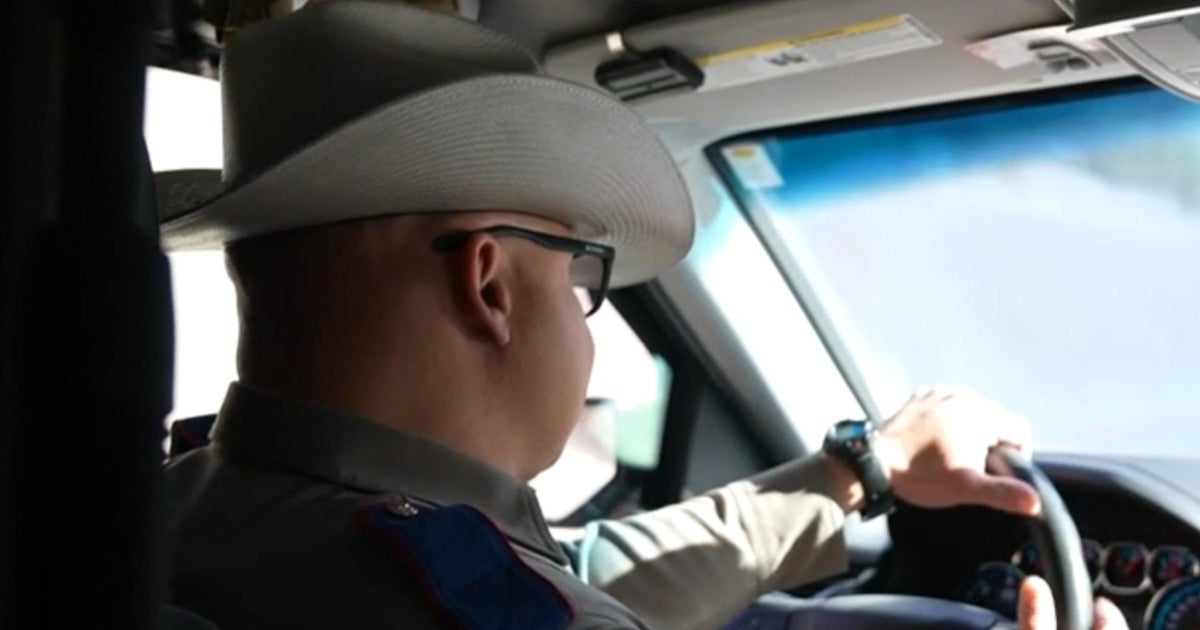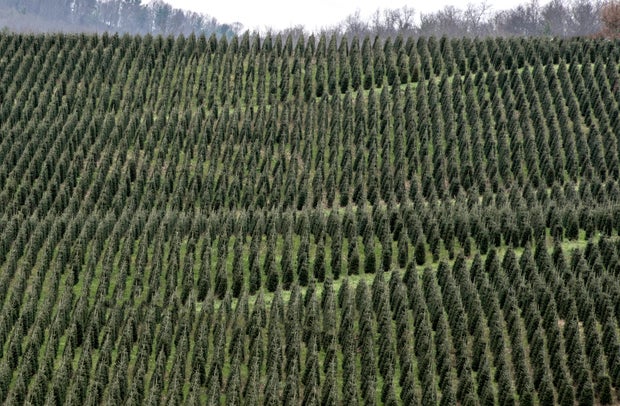CBS News
As climate change threatens Christmas trees, the farming industry tries to evolve

People around the world are adorning homes and businesses with festive holiday decor, which typically means an abundance of Christmas trees are on display. In the U.S., they pop up everywhere from the average living room to the Rockefeller Center plaza in Manhattan and the White House in Washington, D.C.
But climate change threatens to complicate the tradition. Christmas trees, like any other crop, are affected by the general rise in temperature associated with global warming and the extreme weather events that result from it.
“The Earth’s climate is changing to a warmer one. And like most of society and the environment, Christmas trees are not adapting fast enough to these changes,” according to the National Centers for Environmental Information website.
Higher temperatures have led to warmer winters and longer growing seasons, which contribute to the prevalence of pests and disease that damage the trees usually decorated for Christmas. Heavier rain and oversaturated soil also put the trees at risk of contracting a notorious type of fungus-like organism that attacks them at the root, weakening and killing them quickly.
Extreme heat and prolonged drought make Christmas trees more vulnerable to those problems and a host of others, including browning needles and stunted development. Unusual heat alone can cause trees to die prematurely.
In Oregon, where more than a third of country’s Christmas trees are grown, researchers at Oregon State University reported that record heat in the summer of 2021 destroyed roughly 70% of the Christmas tree seedlings planted that year and dried out the needles of more mature crops. Fewer viable trees could mean higher prices for consumers, although experts have largely attributed the steadily rising cost of Christmas trees in recent decades to a supply shortage that dates back to the 2008 recession, in addition to losses from extreme weather.
Extreme cold can be equally destructive for these trees, which are susceptible to frost damage, as can extreme rainfall. In North Carolina, the second-highest producer of Christmas trees in the U.S. after Oregon, farmers contended with the impacts of Hurricane Helene in September.
Justin Whitehill, an assistant professor at North Carolina State University who leads the school’s Christmas tree genetics program, told CBS News that Helene’s landslides posed a particular threat to Christmas trees grown on the sides of mountains and completely wiped out a handful of smaller growing operations, likely costing the industry at least tens of millions.
Estimates from North Carolina State suggest upwards of 40,000 acres of land are dedicated to Christmas tree production statewide, with 5 or 6 million trees harvested annually for a collective retail value of $250 million or more. Whitehill believes the industry remains strong overall because it has been forced to evolve and adapt with climate change.
Getty Images/iStockphoto
“Climate change has been happening and kind of creeping up for decades now. And so the industry has been evolving alongside of it,” he said.
The genetics program at North Carolina State is an example of that. Researchers are studying the natural defense mechanisms of Christmas trees — focusing on a popular variation called Fraser firs — in hopes of using genetics and molecular biology to help the trees acclimate to climate change and increase their chances of survival.
“With our breeding work in the genetics program, we’re trying to identify trees that have a little bit more resilience to some of these changing climates,” said Whitehill. Along with determining how genetics can potentially help Christmas trees withstand warmer temperatures, he said his team is also working on strategies to protect the trees from pests.
Rising temperatures are a major concern for Christmas tree growers. Even if their crops survive pests and disease, Whitehill told CBS News that cosmetics are an issue, too.
“The big thing, I think, with climate change and Christmas trees is going to be the needle loss and needle retention,” he said.
Warmer conditions can cause Christmas trees to shed their needles too early, making them less appealing to people looking to purchase one for the holidays.
Conifers, the cone-bearing and mostly evergreen plant species often marketed as Christmas trees for their classic looks, need to adjust to near-freezing temperatures for several weeks to enter their “dormant” stage before being harvested. Not only are people generally buying Christmas trees earlier in the year, milder fall weather gives the crops less time to reach this stage, where they effectively enter a deep sleep and are alive but no longer growing, or growing very minimally.
The transition into dormancy means different things for different trees as they slow down to prepare for winter. Some shed their leaves completely, but Christmas trees instead use this time to absorb water and nutrients from their needles to conserve energy. A Christmas tree may shed its needles soon after being cut down if it is harvested in the midst of this active transition.
“We’re basically stressing the trees out to the extreme,” Whitehill said. “They’re being kind of killed in a way.”
CBS News
CBS News rides along with Texas sergeant at U.S.-Mexico border

Watch CBS News
Be the first to know
Get browser notifications for breaking news, live events, and exclusive reporting.
CBS News
Canada’s Trudeau faces calls to resign amid Trump tariff threat

Watch CBS News
Be the first to know
Get browser notifications for breaking news, live events, and exclusive reporting.
CBS News
Supreme Court to decide on TikTok’s future in the U.S.

Watch CBS News
Be the first to know
Get browser notifications for breaking news, live events, and exclusive reporting.









